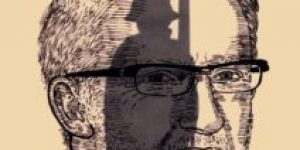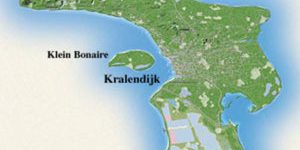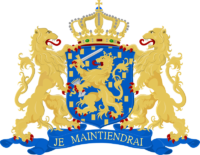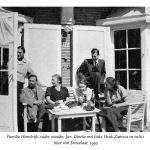The Kingdom Of The Netherlands In The Caribbean. The Politics Of Autochthony And Economic Globalization: Seamy Sides Of The Same Coin
No comments yet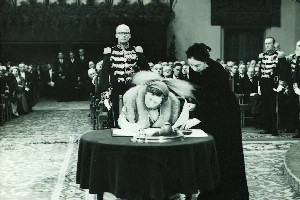
Koningin Juliana tekent het Statuut voor het Koninkrijk der Nederlanden, waarin een nieuwe rechtsorde wordt vastgelegd voor de relatie van Nederland met Suriname en de Nederlandse Antillen
True human progress is achieved not so much by the application of ideas thatare original as by ideas whose application brings more human beings together toshare a richer and fuller life.
John Blacking (1969: 60)
What this essay is about
After 50 years of the Kingdom Charter, the people of Sint Maarten want change. They want their country to gain a separate status within the Dutch Kingdom. A status that will be similar to the one Aruba currently enjoys; one that grants them direct access to the Netherlands, circumventing the bureaucracy of Curaçao. In this essay I argue that the success or failure of their representatives to achieve this goal will depend on how these engage the politics of autochthony, one of the dominant modes of thought of our times.
This mode of thought finds expression in the columns of mainstream public intellectuals in the Netherlands and on Sint Maarten who talk about the loss of ‘authentic culture’ and the cultural alienation of the autochthons. The loss is blamed on the onslaught of globalization, both from within and from without. The intellectuals on the right blame the working class newcomers (Third World globalization agents from within), while those on the left favor presenting us with a secret complot of North American capitalists pulling the strings of the Bush regime (the First World globalization agents from without). It is an odd combination, surreal, but it is one that is effective in a time of anti-Americanism and anti-multiculturalism.
Mainstream public intellectuals in the Netherlands enjoy the respect of the masses as well as the elite. Think of Paul Scheffer, Bas Heijne, Jan Mulder, and Theo van Gogh.[i] Many Dutch people eagerly read their columns, which are increasingly spiced with autochthony. Their success has to do with the fact that those who write well are highly regarded, the vast majority of the Netherlanders can claim to be autochthon, and the idea that Holland is the most tolerant of all Western countries is well ingrained in the minds of most. Many autochthons have imbibed the idea that the US could learn a thing or two from the Dutch, and not the other way around. Unable or unwilling to see the strong economic links between the US and the Netherlands, sentiments of anti-Americanism can proliferate without a sense of hypocrisy. It can be found in the left and in the right of the political spectrum. To strengthen their cause of anti-Americanism, which they equate with anti-capitalism, leftist intellectuals appeal unwillingly to the idea of Dutch exceptionality. Conservative intellectuals appeal to this same idea to warrant their appraisal of working class newcomers. Newcomers should thank God that they have the privilege of living among the tolerant Dutch. They should shed their cultural expressions as soon as possible and become like the Dutch. Newcomer intellectuals such as Ayaan Hirsi Ali who sing praise to this supposed beacon of enlightenment strengthen their sense of Dutch exceptionality.[ii] It is almost a caricature when one observes leftists intellectuals countering those on the right by claiming that it is an aberration of the spirit of Dutch culture to be so intolerant towards newcomers.
The same division between conservative and leftist intellectuals is discernible on Sint Maarten. Leftists cry ‘shame on America,’ adding that the representatives in The Hague and Brussels are also puppets of global capitalists. Sint Maarten will not be healthy until it severs its ties with the Netherlands, joins the bandwagon of Third World states resisting capitalism, and salvages its true ‘autochthon soul’. Those on the right care little about global dynamics, blaming the working class and upper class newcomers for corrupting society. The autochthons are undergoing a process of cultural alienation, becoming strangers in their own country, and therefore they need to assert their right before all his lost. As is the case in the Netherlands, mainstream intellectuals on the left as well as on the right appeal to autochthony.
Truth be said, however, those who appeal to the politics of autochthony on Sint Maarten are a small group with little support among the working classes and the elites. Intellectuals that write columns or books can’t make a living from their craft; it is something they do on the side. Moreover, they have to compete with radio disc jockeys who capture the people’s attention in ways they cannot. By interspersing their messages with the latest Calypso and Bachata hits, these disc jockeys cater to the universals of life, rather than to conventional politics: infidelity, broken homes, domestic abuse, friendship, and the need to love and be loved, things that all human beings experience. Anti-Americanism and autochthony rarely figure in their programs. Many told me that it made little sense to engage in such discussions in a country where 70 % was newcomer, and everyone’s livelihood depends on North American tourism. The lettered champions of autochthony are upper middle class ‘locals’, surrounded by a sea of newcomers whose routes and roots transcend the island. Some popular disc jockeys such as DJ Shadow were quite explicit denouncing the idea of being a separate nation, the ground of autochthony, an affront to humanity
Now when you sit down and look you can’t say who is from SXM [St. Maarten] and who is not, who is ‘local’ and who is not. Furthermore I and I don’t cater for that. That nation business is just hate business, Devil works. Whenever you have a nation, you have an enemy, you have war. Is like that because you going to believe you better than the other man. I mean Bob Marley spoke about this. Listen to ‘War’, there the man is basically telling you that that is nonsense. Madness B [B is a shortened version of brother]. Jah create us all, that nation business is just tribalism.
More weight can be lent to the appeal of disc jockeys, such as DJ Shadow, over and above those of the lettered intellectuals, when one realizes that Sint Maarteners have bred two ‘indigenous ideologies’ that transcend the politics of autochthony. These ideologies are the money tie system and Christianity understood as a meta language. The money tie system is the term used to denote the common sense that the ultimate ground of most relationships on the island is a quest for more money or power. Since one is first and foremost an individual, one is licensed to maximize one’s gains while interacting with others. It matters little whether or not they belong to the same ethnic group as oneself. This is how Trevor, a carpenter originally from Jamaica explained the issue.
… all Man is sinners and this here is Babylon land too [Babylon is the Rasta term for Western dominated Capitalism]. A thing that all over. The money tie system all over. The only thing that a different between SXM and Africa is that here is John Pope land [part of Western Europe], so things better for the hand to mouth people here [Hand to mouth refer to the working classes who earn just enough to feed themselves and not fulfil other desires; the salaries of hand to mouth people go from their hand to their mouths/bellies]…. Yes Babylon make it [selfish behaviour] worse cause Babylon is pure wickedness, but Man will always be selfish. That is the way Man plan. Everybody is checking for himself.
On the other hand, Christianity understood as a meta-language refers to the manner in which Sint Maarteners are encouraged to live up to the Christian derived principles of solidarity and equality. For most Sint Maarteners, ‘Christian’ is a category applicable to anyone who seeks to behave civil in a country where the money tie system is an acceptable fact of life. This is how Violet, a nurse born and raised on Aruba, phrased the matter:
But you ain’t know that Francio, Christian is a passport on this island. Once you is a cool Christian nobody ain’t bothering you; nobody ain’t asking you if you have any papers [ID card, residence or work permit]. Where you come from. On this island we like cool Christians, those who will play they lil number [lotto], curse they lil bad word [swear], but still try to live right. That is the Christian we like and the Christian the tourists like to meet. Not those disgusting ones who constantly reminding you of death [the question of if you die do you know where you are going].
The money tie system and Christianity understood as a meta-language represent the necessity, SXMers would say, of being both a self-interested individual and a non-egoistic member of society. They claim that this irresolvable existential dialectic is operative in all societies. This, they would argue, was the commonality upon which their politicians should seek a dialogue with their counterparts in the Netherlands. They were convinced that this starting point would lead to Sint Maarteners achieving a separate status within the Dutch Kingdom.
Their solution, unlike that of the lettered intellectuals on the island, is thus predicated upon a universal understanding of the human condition. It is an example of what I term a subaltern Globalization of the people against the economic Globalization of the global elite, and the autochthony craze of the lettered classes of the world.
This essay should be read as a note to those representatives of Sint Maarten who seek to truly represent the views of the majority of the islanders. I have divided this paper into three sections. The first section seeks to undo the common sense with which lettered intellectuals in the Netherlands and Sint Maarten talk about Globalization. What I demonstrate is that Globalization has to be understood in the plural; that there are global flows orchestrated by the capitalist elite, and there are counter streams which are based on the experiences of the downtrodden. The latter forms have liberating potential, once they go beyond exclusive ethnicity. I will present the cases of Pan-Africanism and Zionism to demonstrate that within these subaltern forms of Globalization one finds tendencies forwarding a closed ethnic identity as well as open humanity embracing ones. The former ones resemble more localized based autochthony politics. Based upon this exposition I will demonstrate, in the second section, the flaws in the argumentation of mainstream public intellectuals in the Netherlands and Sint Maarten. Examples from both countries will be discussed. The Third section goes on to expound on the money tie system and Christianity understood as a meta-language, the ‘indigenous’ bred ideologies that go beyond a politics of autochthony.
Globalization
Let me begin by tackling the juggernaut we call Globalization, for it is this specter that mainstream public intellectuals in the Netherlands and Sint Maarten summon to stake their claim of autochthony. Within and without academia Globalization is often understood as the increase of the circulation of goods, ideas, cultural expressions, peoples, and finances, which have rendered national borders porous. The counterpart of Globalization is the paradise lost presented to us in the columns of books of vanguard intellectuals. Never mind that an earnest academic can show them that this paradise never existed. The myth is what counts. The problem with such forms of mythology making is that they inhibit serious debate, and they frame Globalization as if it is a one-way process. As if it is one thing. As if the only solution is to assert one’s autochthony, to seek to recreate the paradise lost.
Globalization, however, has to be understood in the plural. It is not solely a process whereby rich American capitalists are promoting commodity fetishism, and in the process disrupt older society-specific ways of relating. The concept of Globalization is not contained by this very real threat alone. For the Pan-Africanism of Marcus Garvey and C.L.R. James, or the Zionism of Theodor Herzl and Martin Buber, to name but a few global movements, are also forms of Globalization. Economic Globalization, symbolized by the New Empire, North America, as Hardt and Negri (2000) assert, is given too much credit when one neglects these subaltern forms of Globalization.
If I might try my hand at definitions, I would state that Globalization is actually a rapid acceleration of what we human beings have been doing all along—and that is exchanging ideas, products, and cultural expressions across boundaries. For as long as human beings have walked on the face of this earth we have been exchanging. And for as long as we have been exchanging we have reacted against the negativities produced through these exchanges. Some of these reactions have been local, but many have also been global. It is the latter reactions that we need to unveil in a period where economic Globalization’s circumference is everywhere, and its center more elusive.
The real question is thus how one can distinguish between positive and negative forms of Globalization. The positive being those exchanges which lead to true human camaraderie. The negative ones being those forms of exchange that create the illusion of irreconcilable differences, those which bring to mind Hobbes’ dictum that Man is a wolf to Man. To be able to discern what is right and what is wrong we need to first understand that no ethnic group has a monopoly over death, destruction, and human carnage. Evil behavior does not belong to people with a specific skin tone, creed, or class background. We also need to realize what Wilson Harris means when he writes that ‘Wound’ and ‘Renascence’ go hand in hand.[iii] ‘Wound’ being a hurt, a pain, inflicted due to human exchanges. ‘Renascence’, being the actions taken towards vindication and regaining of one’s sense of human dignity. A ‘Renascence’ that produces hatred is not a ‘Renascence’, in the Harrisian sense of the term, but a de-humanization of Self and Other.
Subaltern globalization
With this knowledge at hand let us analyze the thinkers of Pan-Africanism and Zionism, two subaltern Globalizations if you wish. Without a doubt Marcus Garvey was one of the great thinkers of his time. He was a product of the ‘Wound’ that Europeans inflicted upon the people of African descent in the New World. He also embodied the ‘Renascence’ of Blacks in the Diaspora, as he was one of the earliest protagonists of Black pride. Garvey encouraged black men and women in the Caribbean, and the wider Americas, to take pride in the land of their ancestors and the color of their skin. Long before the sixties slogan of ‘Black is Beautiful’, Garvey told his followers that the darkest of browns is the color of Man too.
But we also need to understand the fundamental flaw in Garvey’s politics, which was his idea that there existed human races and not one human race. Garvey was a man of his times. And in his times most people believed that there was a distinct African, Asian, and European Race. South African Apartheid, Jim Crow Laws, and the Nation of Islam, are but extreme examples of what may come of the lies that learned men and women have told to themselves and others. The fact of the matter is that there is one human race and we humans have always been mixing. It is a known anthropological fact that the first human beings came out of Africa and thereafter spread across the rest of the world. Differences in phenotype are but superficial adaptations to the environment. Europeans, Asians, Australians, and Americans are disguised Africans. This is what Garvey failed to acknowledge in his public denunciations of white supremacy.
Some pan-African intellectuals did however think beyond the paradigms of their times, and C.L.R. James was one of these. Like Garvey he too was the embodiment of the ‘Wound’ inflicted by European colonialism, and the ‘Renascence’ that came out of that. But unlike Garvey, James advocated black pride divorced of the idea of the distinctness of the ‘Negro Race’.
The novelty of James’ thought was that he believed that Europe or the US could not understand itself unless it truly understood the contribution of the Caribbean to world history. The Caribbean was not solely an effect of Europe, but actually effected Europe. In his seminal work, the ‘Black Jacobins’, he showed that the French Revolution and the Haitian revolution inflected upon each other. Through this work we were led to understand that the famous battle of Waterloo would have been lost if a huge contingent of Napoleon’s troops were not caught up fighting Haitian slaves.
In later works he showed that even the Romantic period was not divorced from the presence of New World slaves. What would the European Romantic age be without Alexander Dumas’ The Three Musketeers, The Man with the Iron Mask, and The Count of Monte Cristo? James made millions of black and white children aware that Alexander Dumas was the Martiniquian son of slave woman. He was the embodiment of the encounter between the colonizers and the colonized. But James went further as he constantly averred that Dumas was no exception, as we all are the offspring of the slave masters and the slaves of history. Therefore revenge, that evil based upon the complete othering of the Other, should have no place in emancipating movements predicated on creating a classless world. This is what C.L.R. James taught us.
In Zionism we see a similar dialectic. It is not a gesture of political correctness or good form to state that Jews have been a people that have sustained indescribable persecution throughout the ages. If there is one constant scapegoat throughout European history, it is the Jewish people. Nazism was only exceptional in so far as its scope; it was not in so far as its stigmatization of Jews. Like the New World Blacks, they too have produced men and women who have embodied both a ‘Wound’ and a spirit of ‘Renascence’. Theodor Herzl, credited with being the mastermind behind the founding of the Jewish state, longed for respect and an end to the persecution of his fellow men. To protect Jews from persecution Herzl proposed the founding of a Jewish state. Where he went wrong was that he saw the Arabs that lived in Palestine as being intruders. For him they were fundamentally different. Herzl, mirroring Garvey, was a man of his times who dared not accept that terms such as Jew and Arab were but nouns that hid the common humanity of these two peoples.
But the ‘Wound’ inflicted upon Jews also bred Martin Buber, a man with a vision paralleling that of James.[iv] Buber’s classic statement was ‘no human being can give more than making life possible for the other; if only for a moment.’ Another statement was, ‘[w] hen I meet a man I am not concerned about his opinions. I am concerned about that man.’ Buber averred that true Zionism could encompass Jews and Arabs, as well as the rest of humanity.
He also made us aware as few others have of the importance of dialogue. He distinguished three forms of dialogue, namely, genuine dialogue, technical dialogue, and monologues disguised as dialogues. Let me start with the latter. A monologue disguised as dialogues is when the people being spoken to are not recognized as being persons. We spit out words at them and treat them as though they were things. A technical dialogue characterizes itself as being about finding objective parameters of truth. Here again the other person is but a means to an end, and we scold him or her for not living up to expectations or grasping ’the truth’. The third type of dialogue, that which Buber coined genuine dialogue is one between equals. We treat the Other as a person, as we would like to be treated. While we may have opposing views, we heed, listen, and seek to build common worlds. We recognize that the Other is also seeking a way in this world.
Autochthony movements in the Netherlands and Sint Maarten
The exposition the thoughts of the four thinkers just discussed lays bare the problematic of the politics of autochthony forwarded by mainstream public intellectuals in the Netherlands and on Sint Maarten. They are hardly interested in genuine dialogue, a dialogue where the people they talk about are recognized as being equals. They are specialists in monologues disguised as dialogues. In their columns and books, they rabble-rouse, accuse, and feed on people’s anxieties. The Other with whom they are in conversation, or better phrased those whom they are talking about, are depicted as rats, lice, and cockroaches corrupting the moral fabric of Dutch and Sint Maarten society.
In the Netherlands this is explicitly manifested in the blaming of immigrants of Moroccan, Turkish, and Curaçaolean descent. Increase in crime, domestic abuse, and religious fundamentalism are made to be synonymous with these groups. What their reading public is offered is nonsense posing as sense. Take for instance the issue of crime. It is a fact that many Morroccan, Turkish, and Curaçaoan youngsters are involved in crime, but so are many ‘autochthon’ Dutch youths. Moreover the ‘Bouw Fraude’, the ‘Betuwelijn’, and the ‘Albert Hein affaire’ are but the tips of the ice berg that demonstrate that men and women in three piece suits are not exempt from the lure of crime.[v] It has always been the case that the offences committed by the working classes are highlighted while the white collar crime that cost the tax payer millions is muffled over.
While residing on SXM I heard mainstream public intellectuals engage in similar blame the victim tactics. It was the Colombians that were spreading immorality, the Indians that were preventing SXMers from getting a job, and the Haitians that were overpopulating the island. If anyone were to believe them, all would be well and swell once the immigrants left the country or stopped with their uncivil ways. Let me grab a concrete example to show the faultiness in their reasoning. In newspaper columns these intellectuals write that East Indians only care about East Indians. They only employ their own. The writers claim that they are not badmouthing anyone. They are just ’stating the facts’.
This form of ‘merely stating the facts’ however, blinds their readers to a fundamental understanding. First, if East Indians merchants truly cared about East Indians workers, they would not have these working 11 to twelve hours a day for meager salaries. That is not a case of caring, but one of plain and simple exploitation. If we take a class perspective on the matter, we realize that upper classes the world over like their workers docile and cheap. East Indian workers, dependent on their employers for a work permit, are as docile and as cheap as they come. Exploitation and racist thought—the latter is also part of the equation—is not an East Indian trait, but one we often find among members of the upper classes.
What the ‘vanguards’ in the Netherlands and on Sint Maarten are espousing is a ‘Renascence’ which excludes and dehumanizes. It is a ‘Renascence’ that is of little utility in Dutch-SXM talks with regards to the latter’s quest in obtaining a separate status within the Dutch Kingdom.
SXM and Dutch dialogues
While Sint Maarten politicians are less susceptible to the ideas of the island’s public intellectuals, they are nevertheless influenced by their discourse. The recent talks between the representatives of Sint Maarten and the Dutch government can be described using Buber’s term as technical dialogues and monologues disguised as dialogues. Beneath the veneer of pleasantries, the Dutch politicians shot off salvos of derogatory remarks at one another. Employing the moral science of statistics, the Dutch camp brings in all kinds of technical arguments to demonstrate that the Sint Maarten civil service is not equipped to be a separate partner within the Dutch Kingdom. Between the lines SXM administrators are accused of being corrupt and reminded that they are peripheral to the Dutch Kingdom. The Sint Maarten camp usually retorts by employing the Law. They interpret the Kingdom Charter in such a way that on a legal and moral basis the Netherlands has to respect their people’s quest to obtain a separate status within the Kingdom. Implicitly the Dutch are accused of being neo-colonialists, and sometimes puppets of international capitalists. Miscommunication is the net result of these kinds of encounters.
The major losers are the Sint Maarten people. This is so since SXM politicians who are contaminated by the politics of autochthony are inadvertently preaching to the Dutch media machine and the ideas forwarded by conservative vanguard intellectuals. They are corroborating the dominant premise of irreconcilable differences between the Dutch and the Antillean ‘identity’. The latter is synonymous with the so-called crime spree of Curaçaoans. Because the general public in the Netherlands cannot distinguish the islands, they usually accept that Sint Maarten is a carbon copy of the mediatized image of Curaçao.
This unfortunate state of affairs can be averted if the conversation SXM politicians have with their Dutch counterparts is one based on a genuine dialogue as Buber would put it. This dialogue would start out by recognizing the analyses of the vanguard for what they are: products of a ‘Wound’ inflicted by economic Globalization. Both the Netherlands and Sint Maarten are experiencing the negative effects of a world where multi-nationals are becoming less bound to nation-states. Dutch multi-nationals, for instance, display little loyalty to the Netherlands. Phillips, Unilever, and Shell, the pride of the Netherlands, have transplanted much of their labor-intensive production processes to Third World countries. That thousands of autochthon Dutch men and women are jobless, and that the newcomers are blamed for the economic malaise is of little consequence to the executive board of Dutch multi-nationals. So too, are the headaches of Dutch politicians who amidst widespread unemployment have to secure amenities for a graying Dutch population. Thus behind their façade of technical prowess, Dutch politicians are just as vulnerable to Global forces as Sint Maarten politicians are. This is what SXM politicians have to realize, instead of being caught up in the outdated jargon such as ‘neo-colonialism’.
A genuine dialogue can only take place when Dutch and SXM politicians begin from the understanding that both are seeking to secure the livelihood of their people, in the midst of a fierce and competitive world market. Sint Maarten’s quest for a separate status can then be seen in the same light as the further integration of the Netherlands within the European Union, namely, a means to better one’s competitive edge.
Implicitly both then may arrive at the understanding that, as the Martiniqueian writer Patrick Chamoiseau phrased it, no country can be truly independent within our global age. Alone, the Netherlands cannot survive. The same is the case for Sint Maarten. We are heading for a world of supra regional blocs: the European Union (EU), the Association of Southeast Asian Nations (ASEAN), Common Market for Eastern and Southern Africa (COMESA), and the Free Trade Area of the Americas (FTAA). There are even initiatives underway to create transoceanic trading groups such as the APEC and the TAFTA. In short, we had the age of colonialism, followed by post-colonialism, and we seem to be heading to a postpost-colonial world.
The politics of autochthony in the Netherlands and on Sint Maarten are politics of retrograde. Sint Maarten politicians need thus to have a future and past oriented outlook, even as they operate in the present. This should be the basis for redesigning Kingdom relations in the 21st century. In other words, while it is necessary to remember that Dutch and Sint Maarten politicians had different social locations in the past, it is equally important to understand that Sint Maarten and Dutch politicians are in a different world than their predecessors were. This is just another way of saying that political economy without a genuine appraisal that the world is forever changing runs the risk of letting in identity politics through the backdoor. Within these changes, the working classes on the island have constructed fundamental humanity as changeless. This was their existentialism.
The money tie system and Christianity as a meta-language
C.L.R. James’ famous dictum was that politics should start at where the people are, and distill the radical possibilities hidden in their way of doing life. While conducting fieldwork on SXM I realized that the conditions of life on SXM had produced two ideologies that offer alternatives to politics based on autochthony. These are Christianity employed as a meta-language and the money tie system. When most Sint Maarteners claim that their society is Christian, what they are actually saying is that they understand that Christian oriented values are and have been historically important. They do not wish to implement a theocracy, or even to exclude other religious practitioners in their society. Let me give an illustration of the many I collected during my fieldwork. In words worthy of Henry David Thoreau (1942), who argued that philosophy’s main task is about bringing men and women to an understanding of their inner-divinity, one middle aged housekeeper I met at a bar told me every one born is a descendent of Adam and therefore they are worthy of being called a Christian. In her words, ‘once you are born you are a Christian. We are all children of God since we all belong to the Adamic race.’ This woman who had enjoyed very little schooling made it clear to me that she understood that every human being is an Adam, a being thrown into the world; a being who must carve out a path in life for him- or herself. That she could see a Christian in every person she met, and those she would never meet, meant that she understood that Christianity was about having an ethical relationship to the Other. And these others are inevitably part of oneself, as all stems from what theologians term God and metaphysicians such as Berkley called the Universal Mind.[vi] This understanding calls for a non-egoistic insertion in the human community.
We should not downplay this example, for what it actually alerts us to is that most SXMers understand what the ideologues among the Dutch Christian Democrats (CDA) are seeking to get across to their constituency. They understand that a healthy society should have a religion in the Durkheimian sense of the term, meaning a transcendental sense of its Self.[vii] But where CDA politicians like many Christian leaders sit in on an ideal plane and criticize the worldly, Sint Maarteners embrace the fallibility of the human condition. During a session at Father Charles, I witnessed the nods of approval when this popular priest reminded his flock of the age-old wisdom that the man who forgets that he is human and tries to behave like an Angel turns out being a beast. We may aim for the stars as long as we do not forsake the earth is what Sint Maarten politicians, basing themselves on their people’s knowledge, can teach their CDA counterparts.
Most Sint Maarteners translated their awareness of the constitutive fallibility of the human condition into an understanding that besides Christianity, their society was held together by an overall recognition of the money tie system. The money tie system conveys their understanding that all relationships are ultimately grounded in a quest for more money and power. In other words they understand that there are no pure disinterested relationships between human beings. Hard economics and status acquisitions are always the non-transparent last instances in all societies. Being a Christian cannot be divorced from this lived reality. This is how Clem, a petty entrepreneur from Dominica reasoned.
…the kind of Christians you looking for, well we don’t have that kind over here so. This here is money tie system land. Come to think of it, I don’t think that kind of Christian Christian [true pious Christians] exists except in the Bible or somewhere where people cut off. Sint Maarten is not a place that is cut off. You hear about the Big Apple, well this here is the Little Apple. That is what the people from the neighboring islands does call Sint Maarten. Anybody on the island who receiving a paycheck can’t say that he born again. If he say that he is, he’s a hypocrite, a stinking dirty liar. Every month that he collect that paycheck knowing that a lot of drugs money does pass through this place he sinning. Every time he say thanks for that tip knowing that it is from people who exploiting they own people in the States, he sinning. We are all sinners, we trying to be Christian, Christian yes, but we can’t be it as long as this island remains being the Little Apple.
Since the Netherlands is also a place that is not cut-off to use Clem’s words, there can be no glorification of the nobility of the autochthon Dutch. This is the reality of both countries, and beneath this social reality Sint Maarteners would argue there is the reality of the simultaneous fallibility and divinity of all humans. According to the plebeians of SXM society, a genuine dialogue between the SXM delegation and its Dutch counterparts begins with this understanding. Who needs the politics of autochthony when by doing life most working class Sint Maarteners have intuitively come to understand that Wilson Harris’ theory of the ‘Wound’ and ‘Renascence’ are fundamentally universal.
NOTES
i. Theo van Gogh was murdered a few months ago by a Muslim extremist for his anti-Islamic views.
ii. Ayaan Hirsi Ali is a Dutch politician who was born and raised in Somalia.
iii. See Kutzinski (1995).
iv. For a detailed exposition of Buber’s thoughts see ‘The life of dialogue 4th edition’ (2002).
v. The Bouw Fraude’ involved fraud and unlicensed cartel activities by major building contractors. The ‘Albert Hein affaire’ was the Dutch version of the Enron accounting scandal. The ‘Betuwelijn’ is a major railway project of the Dutch government which cost much more than the taxpayer was told it would.
vi. For a thorough explanation of major metaphysical thinkers see Vesey (1992).
vii. See Durkheim (1965).
Bibliography
Blacking, John, ‘The Value of Music in Human Experience.’Yearbook of the International Folk Music Council, Vol. 1 (1969), pp. 33-71.
Buber, Martin, The Life of Dialogue 4th ed (translated/edited by M.S. Friedman) London: Routledge, 2002.
Durkheim, Emile, Elementary Forms of Religious Life. New York: Free Press, 1965.
Hardt, Micheal & Antonio Negri, Empire. Cambridge: Harvard University Press, 2000.
James, C.L.R., At the Rendezvous of Victory. London: Allison & Busby, 1984.
James, C.L.R., The Black Jacobins: Toussaint L’Ouverture and the San Domingo revolution. New York: Vintage books, 1963.
Kutzinski, Vera M., ‘The Composition of Reality: a talk with Wilson Harris.’ Callaloo, 18.1 (winter 1995).
Thoreau, Henry David, Walden or, Life in the Woods. New York: The New American Library, 1942.
Vesey, Godfrey, Idealism: Past and Present. New York: Cambridge University Press, 1992.
You May Also Like
Comments
Leave a Reply


